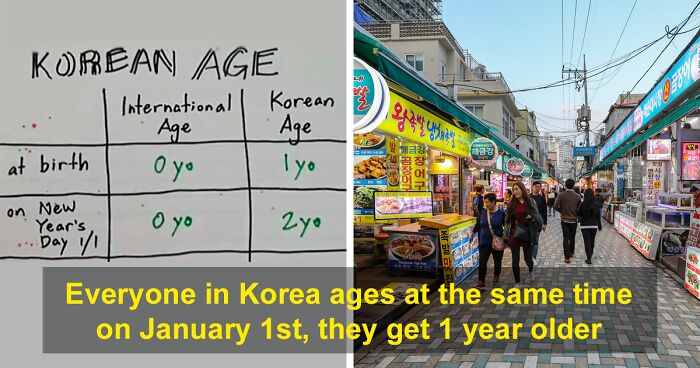
TikToker Explains How The Korean Age System Differs From The International One
You would think that something like calculating a person’s age would be universal and the same in every culture. Turns out, it’s not the case. Just as some cultures calculate in what year they are living differently, Koreans have their own way of determining how old someone is.
A TikTok video explaining it went quite viral, exposing that people living in Western countries weren’t aware of the Korean age system and it’s just interesting how people from different parts of the world have different conceptualizations of the same thing.
More info: TikTok
Turns out, there is more than one way to calculate your age, and two of the countries doing it differently are South Korea and North Korea
Image credits: fgg1031
The TikTok page kaboodaofficial is dedicated to educating people about Korea, teaching them the language, and explaining the curious differences they have, like their age calculation system.
The video that has the most views on the page is the one explaining how Koreans calculate their age. It has 512k views and over 110k likes.
Age is very important in Korean culture as it determines how people will address one another
Image credits: kaboodaofficial
The narrator begins by saying that in Korean culture, age is very important. Often, when you meet Koreans, one of the first questions they ask is your age because they want to establish the hierarchy as there are different ways embedded in the language itself how you address people who are older or younger than you.
The TikTok page kaboodaofficial explains this in the second part of the Korean age series. They immediately say that you never address an older person by name and give examples of how you can address them.
One of the Korean age differences from the international age system is that babies that are just born are considered to be 1 year old
Image credits: kaboodaofficial
And people turn 1 year older not on the day they were born, but on January 1st instead
Image credits: kaboodaofficial
So how is the Korean age system different from the international one? Firstly, when you are born, you’re already 1 year old because Koreans take into consideration the 9 months that a person lived in the womb and round them up to 1 year. Secondly, they consider a person to be 1 year older not on the day they were born, but on January 1st.
So every person in the nation gets older on New Year’s Day. Koreans are aware of the international age and it is actually used in such contexts as courts, hospitals, and public offices. However, in their daily lives, they use Korean age.
Image credits: kaboodaofficial
Because of the Korean age calculation system depending on what time of the year it is, people would be 1 or 2 years older than their actual age
Image credits: kaboodaofficial
If you want to know how old you would be in Korea, kaboodaofficial provides an example. A person born on October 10th, 2010 would be 10 years old now, in September of 2021, because their birthday hasn’t passed yet. But in Korea, that person would be 12 years old (in the video, the narrator made a mistake and addressed it in the comments).
When that person celebrates their birthday, they would be 11 years old in Western countries, but in Korea, they would still be 12 years old. Then they would turn 13 on January 1st.
In the table, there is a formula for how you would know how old you are in Korea. So, if you have already celebrated your birthday, just add 1 to your current age and if your birthday has not yet passed, add 2 to your age.
Image credits: bryan…
In the video below, you can listen to the full explanation
@kaboodaofficial🇰🇷How old are you in Korean age? ##age##birthday##todayyearsold##koreanculture##korea##internationalage##forfun##education##foryou##fyp♬ Stylish Jazz HipHop – Future Oriented Triad
Video credits: kaboodaofficial
The Korean age system is used in both Koreas, and it has been used longer than the two states have been separated
In the comments, people pointed out another way to calculate your Korean age and it may be less confusing
If you are confused just like other people were in the comments when they first found out about Korean age, there is a simpler way to calculate it. Just subtract your birth date from the year we are in and add 1 (since you are already 1 year old at birth).
Also, an interesting fact to know is that this system is used both in South and North Korea as they separated from each other not such a long time ago. The origins of this calculating system are not very clear but it is clear that it goes way back.
It is important to point out that birthdays are also a significant date, it’s just that they turn 1 year older on New Year’s and don’t wait for their birthday
People in the comments had many questions as the Korean age system is so foreign to us. The TikToker explained that even though everyone ages at the same time, birthdays are still celebrated, they just don’t wait for that date to add 1 year.
Even if you are born a few days before New Year’s, when January 1st strikes, you become 2 years old
There were also people giving examples of their own age and the TikToker let them know if they had calculated correctly. Turns out, a baby barely a week old is 2 years old in Korea. Other people just gave up, as they found the math too confusing and complicated.
It can get quite confusing as we are not used to this system and can seem like a task requiring advanced math skills
Have you ever heard of the Korean age system? If it’s your first time hearing about it, do you find it too complicated? Let us know your reactions in the comments! Also, let us know how old would you be in Korea!
If you are 1 at birth and born on December 31st, next day you turn 2? That's two years of your life lost in less than 24 hours!
This is all well explained, but, as someone coming from a Croatian speaking country, living in Korea for over a decade, fluent in Korean, and graduated in linguistics, here is an input from me, that I do not claim to be the truth, but it certainly does make one think. When I first heard the "inclusion of your life inside the belly" explanation, I wasn't satisfied, because pregnancy lasts 9 months on average, not 12. Sure, people in the past probably knew less about medicine and biology, so you may be willing to close an eye on that, but they were no fools either. So, I wonder whether that one is really the reason, or if it was adopted later as some sort of official explanation for the English speaking world, that remained ingrained within culture and the minds of average Koreans. What I really think is going on here has a linguistic basis. In Korea, first of all, we distinguish between, for example, 33살 and 만31새. (Cont.)
The 살 one is what's explained in this article and it's the common colloquial way of expressing one's age. However, the 만x세 one starts from 0 and is birthday based, just like in the international age. Knowing the Korean grammar, that ㄹ ending in the 살 version seems like future tense to me. So maybe - and, again, this is not a claim from me, just a genuine question - that really means not "x years old", but "expected to be x years old" instead? Or "in their xth year of age"? Mathematically speaking, by international standards, when I say I'm 32, it means I've lived 32 years of my life, so technically now I'm living my 33rd year. (Cont.)
Load More Replies...If you are 1 at birth and born on December 31st, next day you turn 2? That's two years of your life lost in less than 24 hours!
This is all well explained, but, as someone coming from a Croatian speaking country, living in Korea for over a decade, fluent in Korean, and graduated in linguistics, here is an input from me, that I do not claim to be the truth, but it certainly does make one think. When I first heard the "inclusion of your life inside the belly" explanation, I wasn't satisfied, because pregnancy lasts 9 months on average, not 12. Sure, people in the past probably knew less about medicine and biology, so you may be willing to close an eye on that, but they were no fools either. So, I wonder whether that one is really the reason, or if it was adopted later as some sort of official explanation for the English speaking world, that remained ingrained within culture and the minds of average Koreans. What I really think is going on here has a linguistic basis. In Korea, first of all, we distinguish between, for example, 33살 and 만31새. (Cont.)
The 살 one is what's explained in this article and it's the common colloquial way of expressing one's age. However, the 만x세 one starts from 0 and is birthday based, just like in the international age. Knowing the Korean grammar, that ㄹ ending in the 살 version seems like future tense to me. So maybe - and, again, this is not a claim from me, just a genuine question - that really means not "x years old", but "expected to be x years old" instead? Or "in their xth year of age"? Mathematically speaking, by international standards, when I say I'm 32, it means I've lived 32 years of my life, so technically now I'm living my 33rd year. (Cont.)
Load More Replies...
 Dark Mode
Dark Mode 

 No fees, cancel anytime
No fees, cancel anytime 



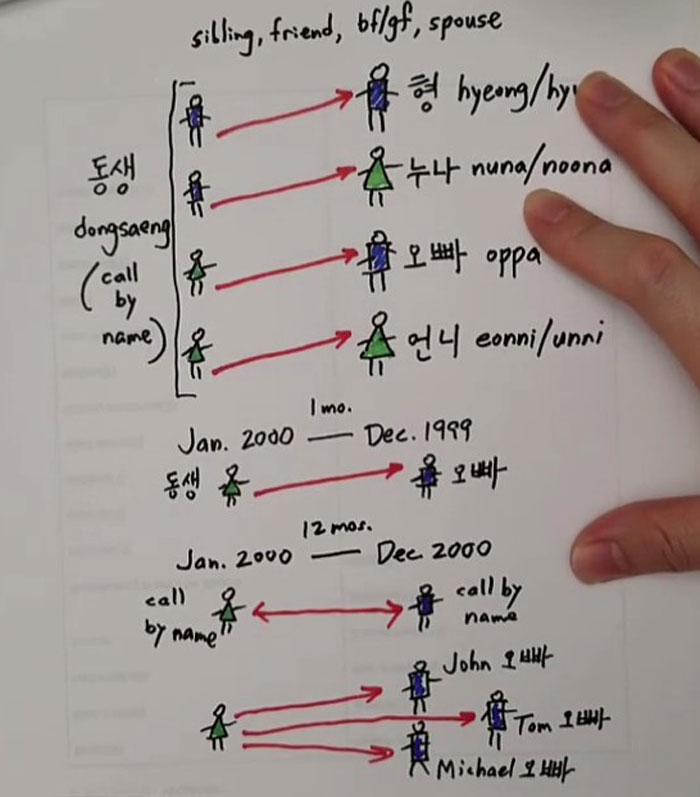
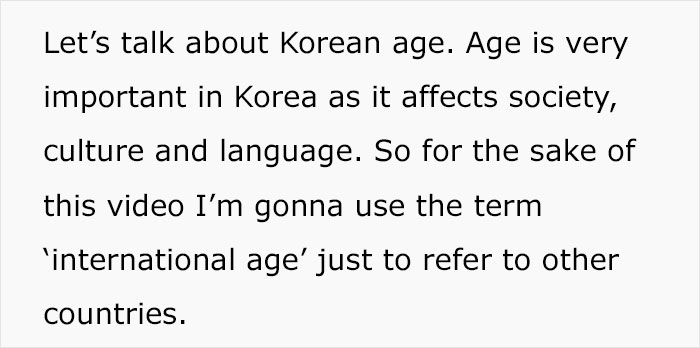
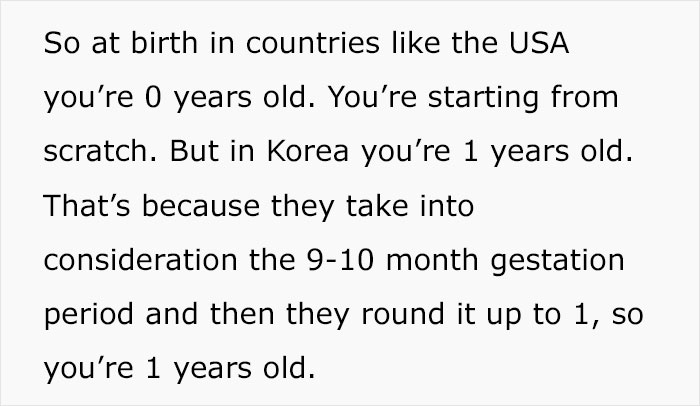
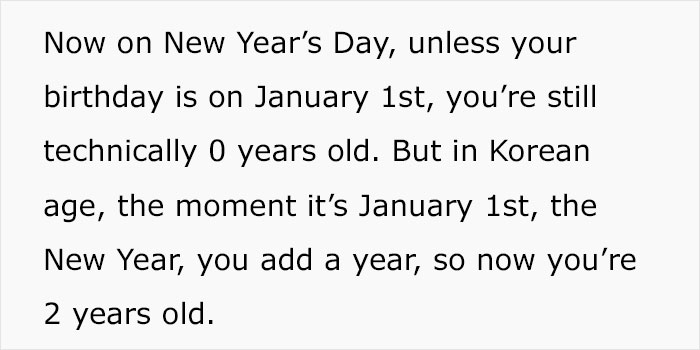
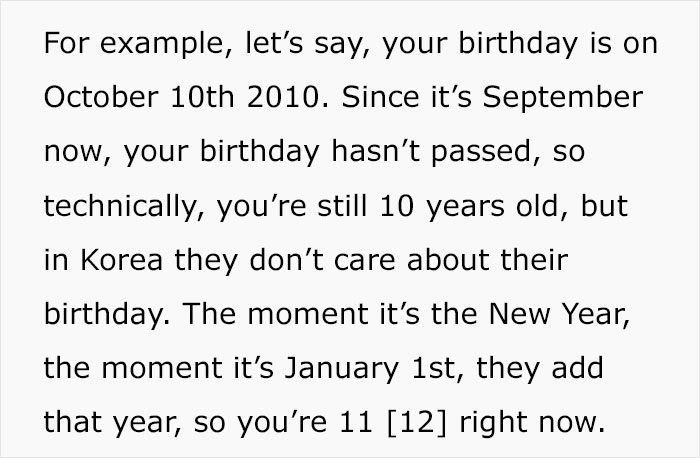
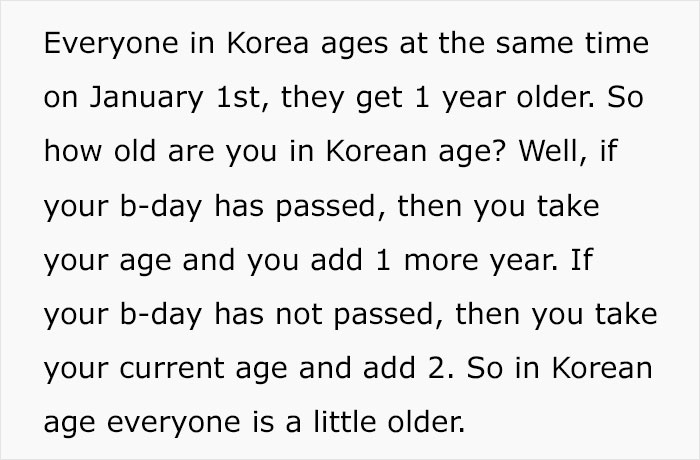
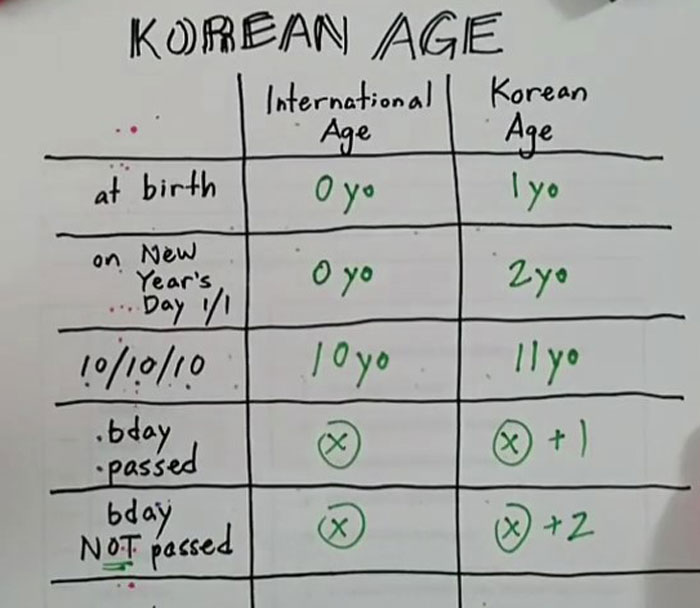



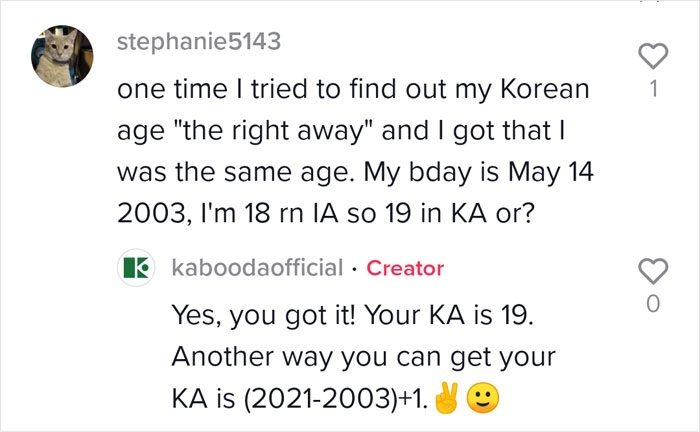
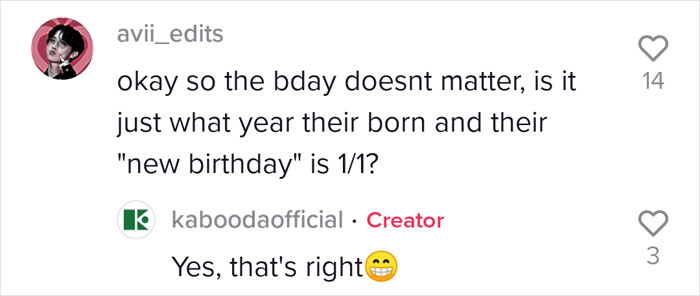
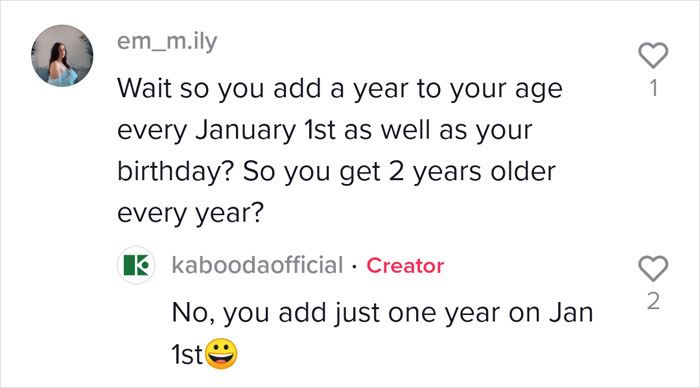
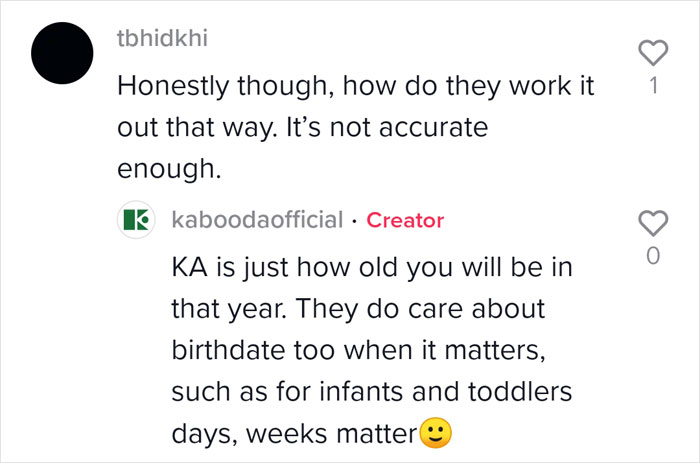
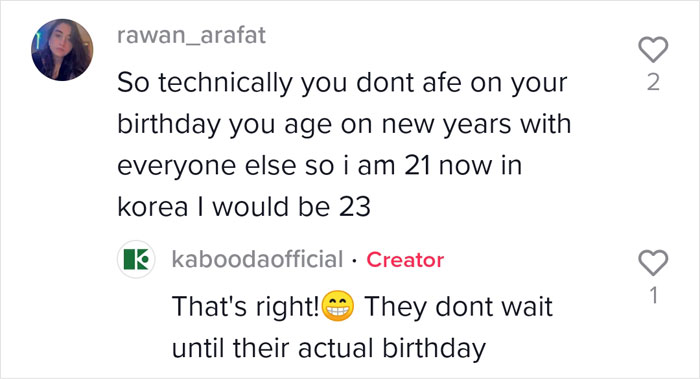
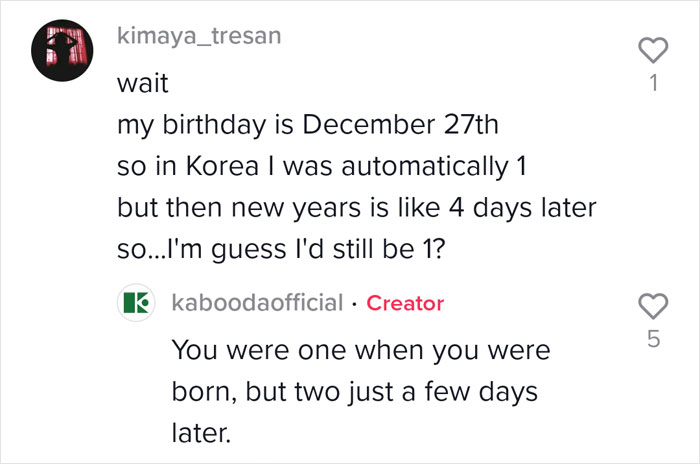









































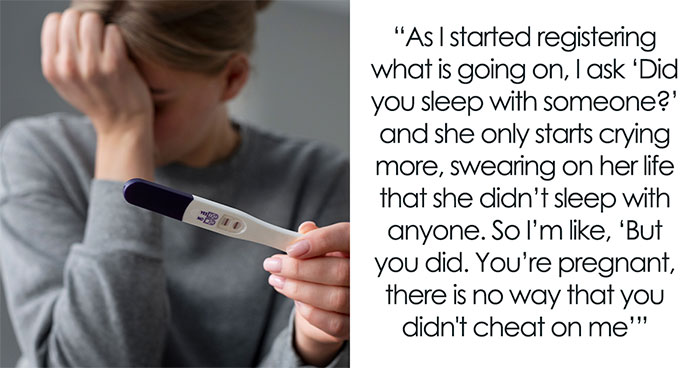




88
44